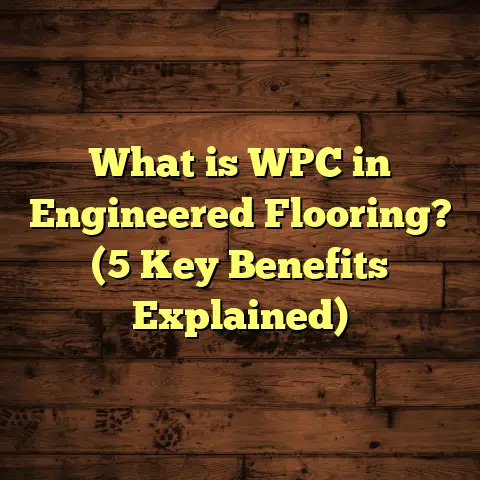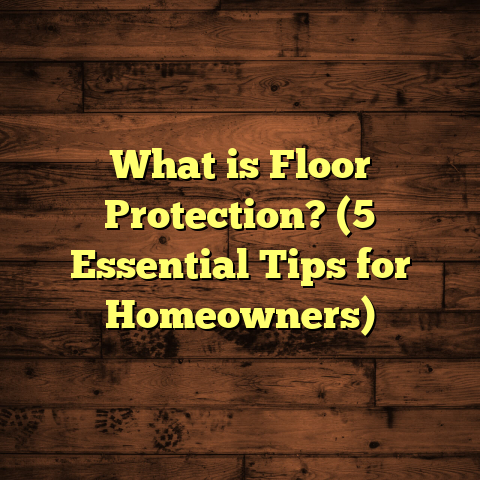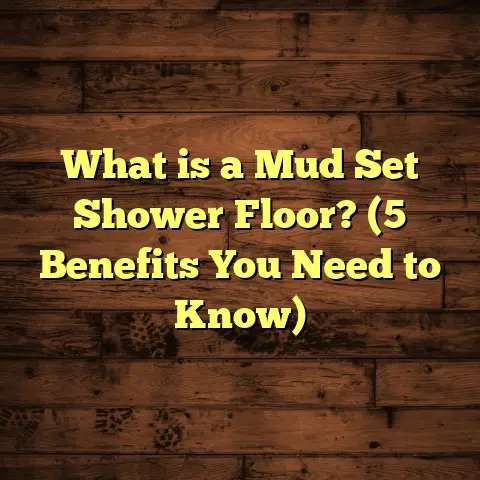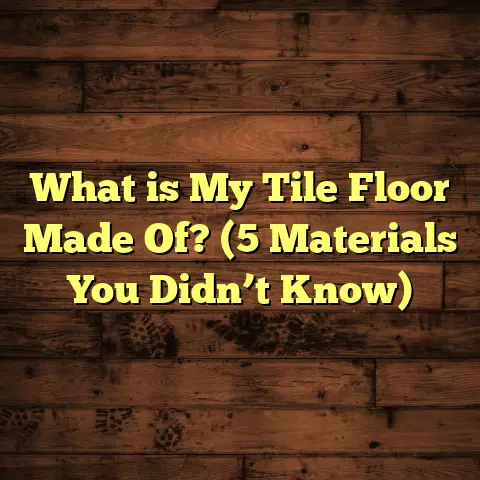What is a Vinyl Safe Floor Cleaner? (5 Tips for Spotless Floors)
I remember the first time I stepped into a friend’s home with stunning vinyl flooring. The floors gleamed under the light, and I couldn’t help but feel a sense of admiration wash over me. It was clear that they took pride in their space, and I found myself wondering how they kept their floors looking so pristine. The secret turned out to be a simple yet effective choice: a vinyl-safe floor cleaner.
Vinyl flooring is a fantastic option for many households, offering durability and style without breaking the bank. However, keeping these floors spotless can sometimes feel overwhelming. That’s where the right cleaning solutions come into play. Let me share my journey into the world of vinyl-safe cleaners, offering tips and insights that I’ve gathered along the way.
Understanding Vinyl-Safe Cleaners
Vinyl-safe floor cleaners are specifically formulated to clean and maintain vinyl flooring without causing damage. These cleaners typically avoid harsh chemicals that can strip the finish or dull the surface. Most of us want to preserve that fresh look of our floors, right? I do!
When selecting a cleaner, it’s essential to check for a few key specifications:
- pH Balance: A neutral pH cleaner (around 7) is ideal. It won’t harm the finish while effectively removing dirt and grime.
- Non-toxic Ingredients: Look for cleaners that boast biodegradable and eco-friendly ingredients. They’re better for your home’s air quality and safer for pets and kids.
- Residue-Free Formula: After cleaning, you want to ensure there’s no sticky residue left behind. This can attract dirt and make your floors look worse instead of better.
The Anatomy of a Vinyl Floor Cleaner
Understanding what goes into vinyl-safe cleaners can help you make better choices. Most vinyl-safe floor cleaners consist of three main components:
- Surfactants: These are compounds that lower the surface tension of water, allowing it to spread and penetrate dirt more effectively. Look for non-toxic surfactants derived from natural sources.
- Solvents: Many cleaners use water as a solvent, but some may include plant-based solvents that help break down grease and grime without harming the floor.
- Fragrance and preservatives: While fragrance can make cleaning more enjoyable, it’s important to choose cleaners with natural scents or those that are free from synthetic fragrances, which can irritate allergies.
My Top 5 Tips for Spotless Vinyl Floors
- Regular Sweeping and Mopping This might sound basic, but trust me, consistency is key. I’ve made it a habit to sweep or vacuum my vinyl floors daily. Dust bunnies and crumbs can accumulate quickly, especially if you have kids or pets. For mopping, I recommend using a damp microfiber mop with a vinyl-safe cleaner. It picks up dirt effectively without leaving excess moisture behind, which can warp the flooring over time. Why Microfiber? Microfiber mops are fantastic because they trap dirt and dust particles better than traditional mops. They require less cleaning solution, making them an eco-friendly choice.
- Spot Cleaning Is Your Best Friend Accidents happen—whether it’s a spilled drink or muddy paw prints. The sooner you address these messes, the better. I keep a spray bottle of my favorite vinyl-safe cleaner handy for quick touch-ups. Here’s a tip: For tougher stains like wine or ink, gently dab with a cloth soaked in the cleaner rather than scrubbing hard. Scrubbing can damage the surface, so patience is key. Stain Removal Insight: In my experience, using a clean white cloth works best for spot cleaning because it won’t transfer any color onto your floor.
- Avoiding Common Mistakes Over the years, I’ve learned what not to do when cleaning vinyl floors. For one, I steer clear of abrasive scrubbers or harsh chemicals like bleach or ammonia. These can scratch or discolor your flooring. Also, don’t use steam cleaners on vinyl; the heat can weaken the seams and cause warping. Stick to gentle cleaning methods to maintain that shine.
- DIY Cleaner for Those Who Love Natural Solutions If you’re into DIY projects, making your own vinyl-safe cleaner can be satisfying! Mix equal parts of white vinegar and water in a spray bottle for a natural alternative. I’ve used this mix countless times—it’s effective and safe! Just remember to rinse with plain water afterward to neutralize any vinegar smell. Vinegar Caution: While vinegar is great for many surfaces, avoid using it on unsealed grout or stone tiles as it can damage them.
- Preventative Measures Go a Long Way I’ve invested in a few area rugs in high-traffic spots to protect my vinyl floors from scratches and wear. Doormats at entrances also help catch dirt before it gets tracked inside. Additionally, consider using felt pads under furniture legs to prevent scratches when moving items around.
Personal Experiences and Insights
Every time I clean my vinyl floors, I think back to when I first installed them. The excitement of choosing the perfect color and texture was exhilarating! But keeping them clean became an even bigger responsibility than I anticipated.
I remember one particular incident when I tried a new cleaner that claimed to be “the best.” After using it, my floors looked dull and lifeless, and I felt defeated. That experience taught me to read labels carefully and stick to products specifically designed for vinyl.
Data-Backed Considerations
Research shows that improper cleaning methods can reduce the lifespan of vinyl flooring by up to 30%. Harsh chemicals and abrasive materials lead to micro-scratches that accumulate over time, making your floors look older than they are. By using the right cleaners and techniques, you can extend the life of your flooring significantly.
A survey conducted among flooring professionals found that 85% recommended using pH-neutral cleaners specifically formulated for vinyl. This statistic reinforces the importance of selecting appropriate products for maintenance.
Statistics on Vinyl Flooring Maintenance:
- According to industry reports, homes with well-maintained vinyl floors retain an average resale value increase of 10% compared to poorly maintained floors.
- Approximately 60% of homeowners reported using commercial cleaners specifically designed for vinyl flooring after experiencing poor results from generic household cleaners.
Case Studies: Cleaning Success Stories
I’ve had success stories from friends who switched to eco-friendly vinyl cleaners after hearing about my experiences. One friend shared how she noticed an improvement in her family’s allergies after eliminating harsh chemical cleaners from her home.
Another case involved a neighbor who had stubborn stains from heavy foot traffic in her entryway. After switching to a specialized vinyl-safe cleaner, she was amazed at how quickly the stains lifted with minimal effort.
Real-Life Example: One winter, I had guests over who tracked snow and mud all over my entryway with their boots. After treating the stains with my homemade vinegar solution followed by a gentle scrub with a microfiber cloth, my floors looked as good as new! It felt rewarding to see immediate results from simple cleaning methods.
Exploring Different Vinyl Cleaner Products
As someone who has tried numerous cleaning products over the years, I’ve developed a keen eye for what works best on vinyl floors. Here are some popular brands and types of vinyl-safe cleaners that I recommend:
- Bona Hard-Surface Floor Cleaner: This cleaner is known for its effectiveness on various hard surfaces, including vinyl. It’s pH-neutral, biodegradable, and leaves no residue behind.
- Rejuvenate All Floors Restorer: Ideal for restoring shine while cleaning, this product is safe for use on sealed hardwood, laminate, tile, and vinyl flooring.
- Zep Neutral pH Floor Cleaner: This cleaner is concentrated, meaning you can dilute it with water for efficient cleaning without damaging your floors.
- Method Squirt + Mop Hard Floor Cleaner: An eco-friendly option that leaves behind a pleasant scent while being tough on dirt.
- Hoover Multi-Floor Plus Hard Floor Cleaner: Great for pet owners as it tackles tough stains while being safe for all hard surfaces.
When trying out new products, I recommend testing them in a small area first to ensure compatibility with your flooring type.
The Importance of Maintaining Your Vinyl Floors
Vinyl flooring is an investment in your home’s aesthetics and functionality. Regular maintenance not only keeps your floors looking good but also helps maintain their structural integrity.
From my observations over years of working with different types of flooring materials, here are some key benefits of maintaining your vinyl floors:
- Longevity: Proper care can extend the life of your flooring by decades.
- Aesthetic Appeal: Clean floors enhance the overall look of your home.
- Health Benefits: Keeping floors free from dust and allergens contributes to better indoor air quality.
- Value Retention: Well-maintained floors can improve your home’s resale value significantly.
Common Misconceptions about Vinyl Flooring Care
Over the years, I’ve encountered several myths regarding the care of vinyl flooring that are worth addressing:
- Myth: You Can Use Any Household Cleaner
- Truth: Not all household cleaners are safe for vinyl; many contain harsh chemicals that can damage the surface.
- Myth: Vinyl Floors Can’t Be Repaired
- Truth: While they can be challenging to repair, minor scratches or dents can often be addressed through specialized repair kits or professional services.
- Myth: Steam Cleaning is Safe
- Truth: Steam cleaning can warp vinyl flooring due to heat exposure; it’s best avoided entirely.
- Myth: You Need Special Tools to Clean Vinyl Floors
- Truth: Simple tools like microfiber mops or soft cloths are often sufficient for effective cleaning.
Additional Tips for Seasonal Maintenance
As seasons change, so do the challenges associated with keeping your vinyl floors clean:
- Spring Cleaning: Use this time to deep clean your floors by moving furniture and applying a thorough scrub with your preferred cleaner.
- Summer Care: Summer brings in more dust and dirt from outside; consider investing in outdoor mats at entrances to minimize tracking.
- Autumn Prep: Protect against falling leaves by regularly sweeping; leaves can stain if left on the floor too long.
- Winter Protection: Use rugs near entrances during snowy months to prevent moisture damage.
Conclusion: Embracing Your Vinyl Flooring Journey
Maintaining spotless vinyl floors doesn’t have to be complicated or stressful. With just a few useful tips and proper care, you can ensure your floors remain beautiful for years to come.
So next time you step onto your shiny vinyl floor, take a moment to appreciate the effort you put into keeping it that way! Have you found any favorite cleaners or methods? Share your story—I’d love to hear about it!





